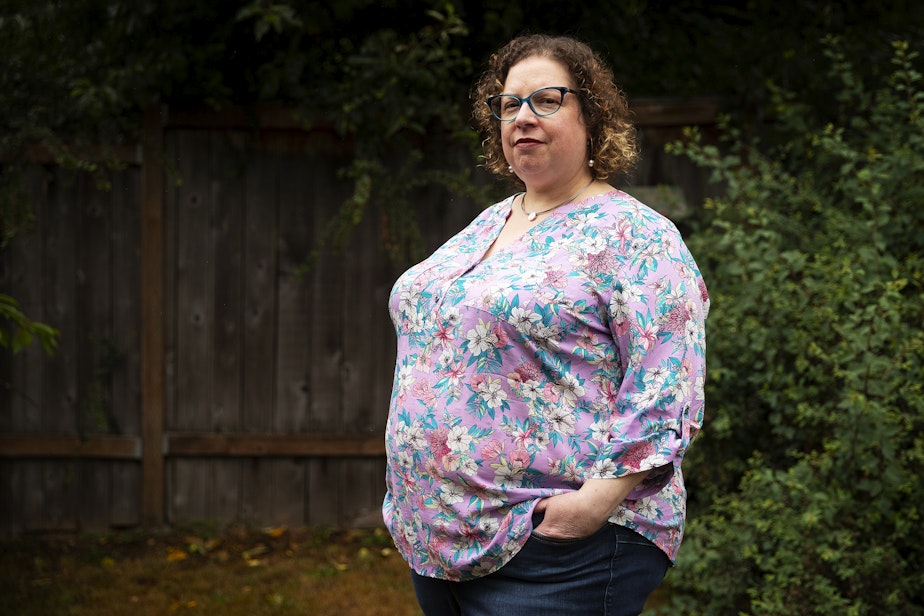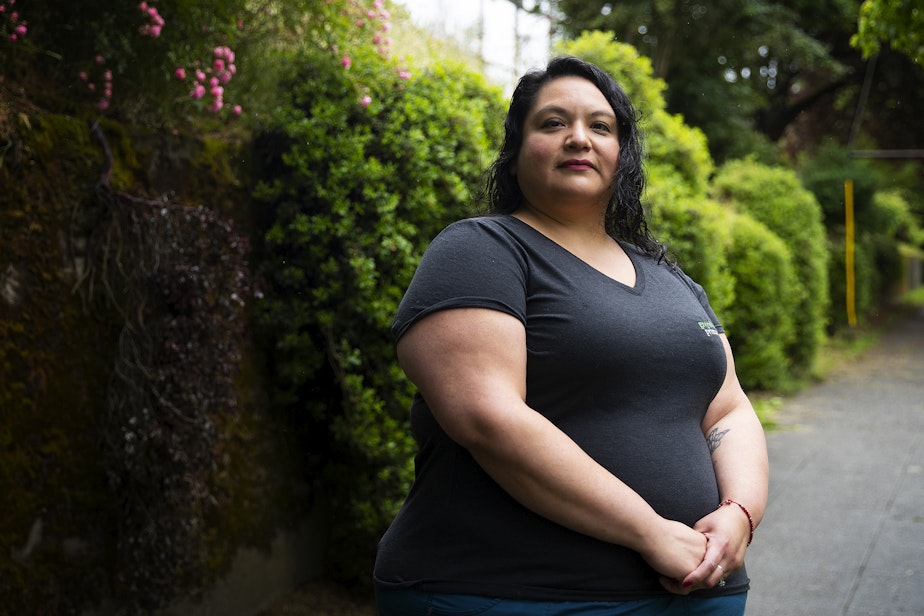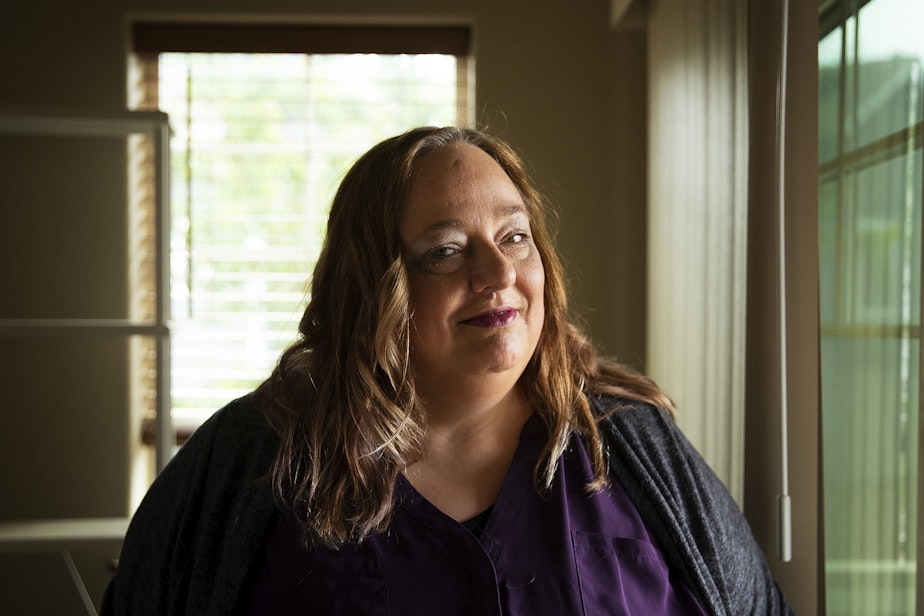Some Seattle doctors are ditching the scale. They say focusing on weight drives misdiagnoses

Almost everyone with a larger body has a horror story about a time they tried to get health care but couldn’t.
Take Beckie Hill. In 2019, she tripped and hurt her knees. When she went to her doctor for a physical therapy referral, her physician prescribed diet pills instead.
“I spent probably half an hour in the parking lot just sobbing,” Hill said. She’d been trying to lose weight her whole life, and had even been hospitalized for anorexia — which she says her doctor knew.
Then there’s Victoria Lopez. She has hereditary sleep apnea — but when she went to see a doctor about it, they told her the solution was to lose weight.
“I’m like, ‘I’ve tried, right? But it’s not helping,’” Lopez said. She stopped going to the doctor for years after that, afraid they’d blame everything on her weight.
Sponsored
Doctors have long emphasized their patients' weight and blamed the health problems of anyone with a larger body on the number on the scale. But patient testimonials, and recent research, show that focus on weight has often led providers to misdiagnose — or miss entirely — their patient’s true health problems.
Also, evidence shows that recommending intentional weight loss can hurt patients’ cardiovascular health in the long term and, in some cases, exacerbate eating disorders. In addition, some healthcare professionals say constantly recommending diet and exercise as a way to lose weight can perpetuate the idea that weight is a reflection of a patient’s behavior and entirely within their control, thereby contributing to the weight stigma that harms the physical and mental health of people with larger bodies.
Now, some Seattle-area providers are trying a new approach: throwing out the scale, and never recommending intentional weight loss.
Dr. Lisa Erlanger is a professor at UW Medicine, where she’s training future providers to look beyond their patients’ weights to identify their health needs.

Sponsored
“There’s so many horrible stories of diagnoses that were missed because the focus was on weight,” Erlanger said.
In fact, she said, in many cases, people in larger bodies aren’t getting enough food — because they’re trying to lose weight — so recommending further weight loss can compound their health problems.
“Sometimes things are blamed on being fat that are actually caused by dieting,” she explained. “For example, losing menstrual periods is often blamed on obesity. But, actually, dieting can cause a loss of menstrual periods.”
Erlanger created a seminar about weight stigma for students close to becoming doctors, dentists, physical therapists, and other health professionals.
The idea is to “get them thinking about how these ideas pervade every aspect of what we've been taught,” Erlanger said, “and then troubleshooting together how we might serve, for example, a family with a larger bodied child who's getting bullied — not to help that child lose weight, but actually to support that child in a well-lived life.”
Sponsored
The problem, Erlanger said, is that intentional weight loss doesn’t work. More than 95% of those who try to lose weight will regain it within five to ten years.
And many of them will end up at a higher weight than where they started.
Erlanger said bouncing back and forth between weights is worse for your health, including your cardiovascular health, than simply existing in a larger body. It can lead to higher blood pressure, increased heart rate, and other cardiovascular problems.
And she said that weight cycling, along with weight stigma, misdiagnoses, and health care avoidance, explain many of the health outcomes usually attributed to higher weight.
Tess Moore, a family medicine doctor in Seattle’s Green Lake neighborhood, tries to provide the best care possible to people of all sizes, in part by not focusing on their weight.
Sponsored

“We always have our gowns of various sizes, speculums of various sizes,” she said on a recent tour of her clinic. There are blood pressure cuffs for different-sized arms. The chairs and exam tables fit all patients.
Dr. Moore said her practice didn’t always look like this. She used to prescribe weight loss to patients until she learned it was bad advice. Now, she has a different philosophy.
“In most cases, the care you’re providing should be the same no matter what the number on the scale is,” she said.
It’s often called weight-neutral or weight-inclusive care. Some providers call it “health at every size,” but not Dr. Moore.
Sponsored
As of last week, the American Medical Association started recommending that providers look past the number on the scale when measuring a patient's health. The new policy says to consider factors like fat deposition, genetics, blood sugar levels, and more.
Dr. Moore goes much further than that.
“We don't recommend weight loss as a way of treating medical conditions,” she said. “We recommend moving your body in a way that’s sustainable, which hopefully is joyful, and eating food in a way that nourishes.”
If a patient wants to lose weight, she asks them why, and she explains that movement is more important than weight loss for health.
“If after that discussion, a patient still is fairly certain that they want to focus on weight loss, I tell them it is cosmetic,” Moore said. “I do tell them the potential harms of weight loss as a directed activity, and I do tell them that it is likely to fail in the long term.”
The push for change isn’t just happening on the provider side. Patients are demanding better care, also.
Sarah Barak is a 40-something marriage and family therapist who lives with her husband and two kids in Seattle’s Ravenna neighborhood. Once, she went to the doctor when an inherited connective-tissue disorder caused her to badly tear the tendons in her thumb.
“He was making the argument that, like, my posture was affecting my arm pain, and that my posture was made worse by my size — all of which could be true,” she said. “But I still had a disconnected thumb, and even if I lost 100 pounds, the thumb would not have been reattached on its own.”
When doctors try to discuss her weight instead of the health problems she comes in for, “I'm very assertive and really push back,” Barak said. “I'll say things like, ‘Okay. Let's pretend you had a thin patient with the same malady. What would you suggest for that thin patient?’”
But, she said, “it’s freaking exhausting.”
Despite the growing evidence that this works, weight-neutral health care is still far from mainstream, and finding it can require self-advocacy and even out-of-network costs that not everyone has the knowledge, time, or money for.
Health experts say the next step is to make sure evidence-based care is available to everyone.




